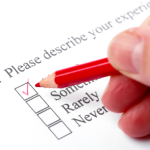Ilana Jacqueline Freelance writer, patient advocate
This is a challenge for all of us with a Chronic illness. Ilana gives some great suggestions on how to handle this situation.
“I don’t generally go into the long and sordid story of how me and the majority of my family get on with my chronic illness. But what better time to explore how uncomfortable the tea parties with the skeletons who live in my closet go than right around the holiday season?
I wouldn’t feel right going into who said what, but I hope some general advice can help others deal with their families and their chronic illness during this time of year.
Nothing says we’re kin more than hearing I think you’re faking an illness while on your eighth day in the hospital. And nothing spells out I love you more than taking six agonizing months to decide whether or not you’ll give a vial of blood for genetic testing (even if it means not having to watch your relative rot away from a progressive, rare disease).
Having the support of your entire family is a pipe dream for most patients — especially when it comes to invisible diseases like fibromyalgia, crohns, ehlers-danlos syndrome, narcolepsy, postural orthostatic tachycardia syndrome, lupus and immune deficiencies.
So even having one person in your life who supports you, educates themselves about your condition, learns about the medical choices you have to make and actively takes a role in caregiving for you is a major blessing. I’m lucky to have a handful of people in my life who understand my disease. Some blood, some not. Some who have been there all along — and some who finally one day understood that there was a difference between who you are and what you have.
I’ve felt my heart being wrung out like a wet towel when people who I thought would be there to love and support me suddenly exiled me from their lives completely. And I’ve been heartbroken over the people I’ve had to exile from my life because their judgement was becoming too heavy for me to deal with on a daily basis.
How are you supposed to make a decision like that? To pluck someone from your life and give away the relationship you’ve had? It’s never an easy decision. It’s never going to feel okay to oust a relative (near or far) from your life. But I’ve had to make that decision and here’s what I based it on
– Is this person actively talking crap either directly to your face, or behind your back to people they know and hope will tell you their negative judgement? (Yes)
– Has this person attempted to research your disease either by searching online for support groups, visiting one in person, asking for permission to speak with your doctor, visiting websites, Facebook groups, or finding other patients to speak with? (No)
– Does this person chronically accuse you of faking your illness for attention, trying to gain sympathy, or trying to get out of school or work? (Yes)
– Did this person have a strong relationship with you before your illness progressed? (No)
– Does this person have a belief system you don’t subscribe or apply to? (A religion that says god can cure you if you just pray and then blames you for not praying hard enough. A diet that they believe is the cure to all that ails that you’ve tried and didn’t work. A holistic treatment that does not fully control your symptoms that they blame you for?) (Yes)
– Does this person blame you for trying different treatments despite having never researched the medication themselves? (Yes.)
– Does this person consistently leave you depressed, frustrated, sad or even guilty-no matter where or when the encounter? (Yes.)
These factors all played into me leaving relationships with relatives because of my illness. That’s not to say that there still aren’t people in my life who don’t understand my disease. I actually really don’t mind many of my family/friends not “believing” that I truly have an illness despite plain and verifiable blood work.
Here are some ways I deal with these people in my life
– I know these people just don’t want to acknowledge my illness so I don’t see or communicate with them during a flare up.
– I do not ask these people for assistance with anything related to my disease. No “please take me to the doctor” no requests for any sort of assistance emotionally, financially or physically.
-When these people ask, “How are you feeling?” I reply, “I am feeling fine. How are you?” It does not matter how I am feeling. They do not care to know, and I do not care to tell. It will not make either of us any different for me to respond, “I am feeling like I’m about to start bleeding from my eyeballs.”
– I don’t interact with these people online, only in person. This means I don’t ambush them on social media with my status updates and don’t ask them to visit my website. They know I blog — if they want to find me they can Google me.
– If I am at a family dinner or event and someone brings up my illness I change the subject.
Harsh, right?
But there’s a big difference between having people actively hate you for something you can’t control and having them tolerate you for something you can.
When I was 15 I didn’t have any social clarity about my disease. I didn’t know what my disease was and I had no idea who I was either. I couldn’t understand why it was inappropriate to talk about my symptoms to family. I had no idea how they actually felt about me or my illness.
When I started to hear the opinions of some of my relatives about me… it completely broke my heart. I don’t think anyone could hear those sort of things and not crumble. These people are supposed to love you no matter what, right? And for them to have such aggressive attitudes toward me and the nature of my disease confused the crap out of me for a long time.
I’m not sure I handled the situation with any of my relatives “the right way.” I didn’t know whether to ignore them or defend myself or lash out or force them to read about my condition or completely throw them out of my life. And everyone was different-even if they were all coming to the same conclusion on me.
It was more hurtful to hear the opinions of people who knew me growing up than the ones that had been thousand of miles away for most of my life. At least then I could put it all under the category of “they have no idea what they’re even talking about.”
It can also be scary to leave people out of your life when your world feels like it’s getting smaller and smaller from your illness every day. For me, the decisions to emotionally separate from some of these relatives came from the security of my diagnosis. To be undiagnosed with a chronic disease is beyond devastating and can leave you constantly questioning, “Is this real?” “Could everyone be right?” “Am I crazy?”
Yeah, for me the confirmation that I wasn’t crazy really did come with a blood test. And once I could unwind myself from the delusion that I was insane and come to terms with the facts about my disease, it was really only a matter of time before I could start to stand up for myself and ask for people in my life to try what I was trying: separating my illness from my personality.
And wouldn’t you know it? Some people actually really liked me then!
Most of all I try to remember a few key things:
– No one is inherently evil and out to get you. People either understand or they don’t.
– People change. Someone who might not support you today could reach out and learn how they can be a better relative tomorrow.
– You’re not alone. I’ve met and spoken with hundreds of patients about chronic illness. I’ve yet to interact with one person who had their entire family’s support.
– You can’t ask anyone to love you until you love yourself (sick, healthy or somewhere in-between).
– Family comes out of the most ass-backwards places and people you might have never imagined even being friends with may one day offer you the most life-altering compassion.
– Not everyone is meant to be in your life. You’ll know who when the relief settles in an hour after you’ve blocked their email and changed your number
– A well-lived life is the best revenge.
We now have a better understanding about how to deal with relatives and friends. They really care but many times do not know how to respond or help us.
Click here for the original source of this article
We appreciate your Likes and Comments.



I really wanted to, but I did not like this article. It was not what I thought it would be, where there’s be a bulleted format of answers. Instead you had to read the entire article, which was exactly like someone’s personal journal. It didn’t answer any questions, certainly not mine
Your incredibly brave and accepting. Ive been chronically ill for many years and my heart is a bit broken from the comments and judgement especially as I’ve just left work am experiencing a flare and am starting to question my worth. Thankyou for your advice.
Do you have any advice for how to cope when the family you live with and who cares for you treats you this way? I have considered moving out and getting help with a funded carer but this will likely add maybe more stress than I already have.
I’ve had about 20 prcedures/surgeries, I’ve had to catheterize in the back seat of my sister’s jaguar, I lost my job, my dog and my place to live. My Sister tells people im crazy, not sick.
My Dad took me to surgeries but really never reached out to help on a regular basis. I was told noone wants to hear about my problems, then when they would see me and I didn’t talk about how I was feeling I would hear, well y I u seem so much better when you get out of the house. My family was making my illness worse, I finally moved 1,500 miles away from them and 5 years later I no longer have to go to the ER 4-5 times/year, my pain level does nit jump from a 5 to a 10 in a few minutes. I am able to tell myself to relax and control my pain somewhat. My family was never very close but when you are sick and your family does not believe or support you, it makes it 10 times worse, always questioning yourself. It is a living hell.
I moved in with very supportive friends and of course I went through the whole guilty feelings of going a burden and I would have walked away, but they never gave up on me and the knew me enough I ugh to know that once I understood all if what happened and learned how to live with my disease I would get better and my depression would get better.
Thank God for my friends believing in me. I might not be here if they did not.
Thank you for this article, I learn something new in everything I read….🥰